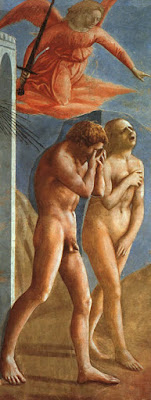All he believes are his eyes
See just this Post & Comments / 0 Comments so far / Post a Comment / Homeaka, Sunday meditation on 'brisa suave' / soft breeze.
Now, he's hell-bent for destruction,
He's afraid and confused,
And his brain has been mismanaged with great skill.
All he believes are his eyes
And his eyes, they just tell him lies.
Bob Dylan, License To Kill, Infidels, 1983.

 Before & After the Fall. Bookends. Like Genesis & Revelations.
Before & After the Fall. Bookends. Like Genesis & Revelations.It could be that the beginning and the end, the Alpha and the Omega as it were, has always been physical loving. Once is forever. Though modern histories require transcendence of the simple categories of faithfulness ... and then some!
There is more to it than 'fazendo a coisa', 'doing the business' ... fucking. Raising children being an intense physical intimacy too, and not unconnected with the genitals.
Getting above those first few chakras is a big step, mostly determined (I would hazard) by capabilities, personality colours, (what's that word? ...) oh yeah! temperament - in this case making principles of your capacities rather than your incapacities, but still ... and then, maybe it is no step at all, yet another snake eating yet another tail that turns out to be its own.
Arthur Merric Bloomfield Boyd, Expulsion:





Estimados irmãos e irmãs, sejam bem-vindos à Celebração da Eucarista. Rendamos graças ao Pai por nos ter dado um sinal, a Palavra de seu Filho e a sua voz: tende confiança, sou eu, não tenhais medo! É a presença do Deus da brisa suave, o Deus da mansidão em nossas vidas.
Hoje, é o domingo dos pais, da sua vocação à paternidade. Rezemos para alcançar, cada vez mais, um coração de filhos e filhas. Aclamemos nosso Deus.
Igreja de Nossa Senhora do Carmo, Rio Grande, 10 de agosto de 2008.
Marc Chagall, Temptation:






(The woman in the third photograph is not Bella, who died in 1944.)
The attributes of liminality or of liminal personae ("threshold people") are necessarily ambiguous, since this condition and these persons elude or slip through the network of classifications that normally locate states and positions in cultural space. Liminal entities are neither here nor there; they are betwixt and between the positions assigned and arrayed by law, custom, convention, and ceremonial. As such, their ambiguous and indeterminate attributes are expressed by a rich variety of symbols in the many societies that ritualize social and cultural transitions. Thus, liminality is frequently likened to death, to being in the womb, to invisibility, to darkness, to bisexuality, to the wilderness, and to an eclipse of the sun or moon.
Liminal entities, such as neophytes in initiation or puberty rites, may be represented as possessing nothing. They may be disguised as monsters, wear only a strip of clothing, or even go naked, to demonstrate that as liminal beings they have no status, property, insignia, secular clothing indicating rank or role, position in a kinship system - in short, nothing that may distinguish them from their fellow neophytes or initiands. Their behavior is normally passive or humble; they must obey their instructors implicitly, and accept arbitrary punishment without complaint. It is as though they are being reduced or ground down to a uniform condition to be fashioned anew and endowed with additional powers to enable them to cope with their new station in life. Among themselves, neophytes tend to develop an intense comradeship and egalitarianism. Secular distinctions of rank and status disappear or are homogenized.
...
What is interesting about liminal phenomena for our present purposes is the blend they offer of lowliness and sacredness, of homogeneity and comradeship. We are presented, in such rites, with a "moment in and out of time," and in and out of secular social structure, which reveals, however fleetingly, some recognition (in symbol if not always in language) of a generalized social bond that has ceased to be and has simultaneously yet to be fragmented into a multiplicity of structural ties. These are the ties organized in terms either of caste, class, or rank hierarchies or of segmentary oppositions in the stateless societies beloved of political anthropologists. It is as though there are here two major "models" for human interrelatedness, juxtaposed and alternating. The first is of soociety as a structured, differentiated, and often hierarchical system of politico-legal-economic positions with many types of evaluation, separating men in terms of "more" or "less." The second, which emerges recognizably in the liminal period, is of society as an unstructured or rudimentarily structured and relatively undifferentiated comitatus, community, or even communion of equal individuals who submit together to the general authority of the ritual elders.
I prefer the Latin term "communitas" to "community," to distinguish this modality of social relationship from an "area of common living." The distinction between "secular" and "sacred," or that, for example, between politics and religion. Certain fixed offices in tribal societies have many sacred attributes; indeed, every social position has some sacred characteristics. But this "sacred" component is acquired by the incumbents of positions during the rites of passage, through which they changed positions. Something of the sacredness of that transient humility and modelessness goes over, and tempers the pride of the incumbent of a higher position or office. This is not simply a matter of giving a general stamp of legitimacy to a society's structural positions. It is rather a matter of giving recognition to an essential and generic human bond, without which there could be no society. Liminality implies that the high could not be high unless the low existed, and he who is high must experience what it is like to be low.
...
Victor Turner, The Ritual Process, Structure and Anti-Structure,
Aldine Transaction 2008 (publisher), p95-97.
He does not go on to immediately define Anti-Structure (as I would have wished), but it is becoming implicitly clearer to me.
| Matthew 14, 22-33: And straightway Jesus constrained his disciples to get into a ship, and to go before him unto the other side, while he sent the multitudes away. And when he had sent the multitudes away, he went up into a mountain apart to pray: and when the evening was come, he was there alone. But the ship was now in the midst of the sea, tossed with waves: for the wind was contrary. And in the fourth watch of the night Jesus went unto them, walking on the sea. And when the disciples saw him walking on the sea, they were troubled, saying, It is a spirit; and they cried out for fear. But straightway Jesus spake unto them, saying, Be of good cheer; it is I; be not afraid. And Peter answered him and said, Lord, if it be thou, bid me come unto thee on the water. And he said, Come. And when Peter was come down out of the ship, he walked on the water, to go to Jesus. But when he saw the wind boisterous, he was afraid; and beginning to sink, he cried, saying, Lord, save me. And immediately Jesus stretched forth his hand, and caught him, and said unto him, O thou of little faith, wherefore didst thou doubt? And when they were come into the ship, the wind ceased. Then they that were in the ship came and worshipped him, saying, Of a truth thou art the Son of God. | Mateo 14, 22-33: Logo a seguir, compeliu Jesus os discípulos a embarcar e passar adiante dele para o outro lado, enquanto ele despedia as multidões. E, despedidas as multidões, subiu ao monte, a fim de orar sozinho. Em caindo a tarde, lá estava ele, só. Entretanto, o barco já estava longe, a muitos estádios da terra, açoitado pelas ondas; porque o vento era contrário. Na quarta vigília da noite, foi Jesus ter com eles, andando por sobre o mar. E os discípulos, ao verem-no andando sobre as águas, ficaram aterrados e exclamaram: É um fantasma! E, tomados de medo, gritaram. Mas Jesus imediatamente lhes disse: Tende bom ânimo! Sou eu. Não temais! Respondendo-lhe Pedro, disse: Se és tu, Senhor, manda-me ir ter contigo, por sobre as águas. E ele disse: Vem! E Pedro, descendo do barco, andou por sobre as águas e foi ter com Jesus. Reparando, porém, na força do vento, teve medo; e, começando a submergir, gritou: Salva-me, Senhor! E, prontamente, Jesus, estendendo a mão, tomou-o e lhe disse: Homem de pequena fé, por que duvidaste? Subindo ambos para o barco, cessou o vento. E os que estavam no barco o adoraram, dizendo: Verdadeiramente és Filho de Deus! |

 Ivan Illich looked at the story of The Good Samaritan, and discovered there a network of agape, spiritual love, based upon touch, based in flesh.
Ivan Illich looked at the story of The Good Samaritan, and discovered there a network of agape, spiritual love, based upon touch, based in flesh.Imagine for a moment that you are Peter, in a stormy sea in the darkness of night, and for some reason you step out onto the waves to go to Jesus when He calls you, but you begin to sink until He stretches out His hand and pulls you up.
Is it just possible that He was smiling when He chided, "O thou of little faith, wherefore didst thou doubt?"
Or, if you read my last post carefully, imagine that you are a prostitute working in Vila Mimosa, and one night for some reason you let yourself come, maybe it happens to be the Dia Mundial do Orgasmo - and the next thing you are marrying the guy and leaving 'the life' (as they call it).
Born again? Is that it? :-) Be well.
Liminal: Of or pertaining to the threshold or initial stage of a process. Of or pertaining to a ‘limen’ or ‘threshold.’
Limen: The limit below which a given stimulus ceases to be perceptible; the minimum amount of stimulus or nerve-excitation required to produce a sensation. Also called 'threshold'.
Even, say, "Put the Lime'n the coconut ..."
A-and, lest I be accused of kitchen-sink-ism, I specifically did not mention neither Judges 19:27, nor Luke 13:25, nor even Revelations 3:20, nor Leonard Cohen's, "So I knelt there at the delta, at the alpha and the omega," nor Brother Bob and his, "Should I leave them by your gate?." There!
More on Arthur Boyd at Galeria Aniela, on Marc Chagall at Mirol Art.
Well, maybe just a bit of the kitchen sink eh? Here's Gee Officer Krupke from West Side Story (the relation is through the line, "I'm depraved on account'a I'm deprived!"):
| Tiger, Imitating Krupke: | Hey you! | |
| Riff: | Who me, Officer Krupke? | |
| Tiger, Imitating Krupke: | Yeah you, gimme one good reason for not draggin' ya down the station house, ya punk! | |
| Riff: | Dear kindly Sergeant Krupke You gotta understand It's just our bringin' upke That gets us out of hand. Our mothers all are junkies, Our fathers all are drunks, Golly Moses, natcherly we're punks. | |
| Jets: | Gee, Officer Krupke We're very upset. We never had the love That every child oughta get. We ain't no deliquents. We're just misunderstood. Deep down inside us there is good! | |
| Riff: | There is good! | |
| Jets: | There is good, there is good. There is untapped good. Like inside, the worst of us is good. | |
| Tiger, Imitating Krupke: | That's a touching good story. | |
| Riff: | Lemme tell it to the world! | |
| Tiger, Imitating Krupke: | Just tell it to the judge! | |
| Riff: | Dear kindly Judge, your Honour, My parents treat me rough, With all their marijuana They won't give me a puff. They didn't wanna have me But somehow I was had. Leapin' lizards, that's why I'm so bad! | |
| Snowboy, Imitating Judge: | Right! Officer Krupke You're really a square. This boy don't need a judge He needs an analyst's care. It's just his neurosis That oughta be curbed. He's psychologically disturbed. | |
| Riff: | I'm disturbed | |
| Jets: | We're disturbed, we're disturbed, We're the most disturbed. Like we're psychologically disturbed. | |
| Snowboy, Imitating Judge: | Hear ye, hear ye. In the opinion of this court, this child is depraved on account he ain't had a normal home. | |
| Riff: | Hey, I'm depraved on account'a I'm deprived! | |
| Snowboy, Imitating Judge: | So take him to a headshrinker. You! | |
| Action: | Who me? | |
| Riff: | My daddy beats my mommy. My mommy clobbers me. My grand'pa is a commie. My grand'ma pushes tea. My sisters wears a moustache. My brother wears a dress. Goodness gracious, that's why I'm a mess! | |
| Action, Imitating Headshrinker: | Yes, Officer Krupke He shouldn't be here. This boy don't need a couch He needs a usefully career. Society has played him a terrible trick And sociologically he's sick! | |
| Riff: | I am sick! | |
| Jets: | We are sick, we are sick. We are sick sick sick. Like we're sociologically sick! | |
| Action, Imitating Headshrinker: | In my opinion, this child does not need to have his head shrunk at all. Juvenile delinquency is purely a social disease. | |
| Riff: | Hey, I got a social disease! | |
| Action, Imitating Headshrinker: | So take him to a social worker! | |
| Riff: | Dear kindly social worker, They tell me get a job. Like be a soda jerker Which means I'd be a slob. It's not I'm antisocial I'm only anti-work. Glory Osky, that's why I'm a jerk! | |
| A-Rab: | Eek, Officer Krupke You've done it again. This boy don't need a job He needs a year in the pen. It ain't just a question of misunderstood, Deep down inside he's no good! | |
| Riff: | I'm no good! | |
| Jets: | We're no good, we're no good We're no earthly good. Like the best of us is no damn good! The trouble is he's lazy. The trouble is he drinks. The trouble is he's crazy. The trouble is he stinks. The trouble is he's growing. The trouble is he's grown. Krupke, we've got troubles of our own! Officer Krupke, We're down on our knees! | |
| Riff: | 'Cause no one wants a fella With a social disease! | |
| Jets: | Dear Officer Krupke What are we to do? Gee, Officer Krupke, Krup you! |


















Preta Gil, daughter of Gilberto Gil now the ex-Minister of Culture, and was Rainha da Bateria de Mangueira. Her blog, and another blog (the same blog?) with lots of photographs. She is reported to have said, "Estou gorda mas estou linda e gostosa." / "I may be fat, but I'm beautiful and tasty." Indeed, if she didn't say it she should have :-)
Down.



